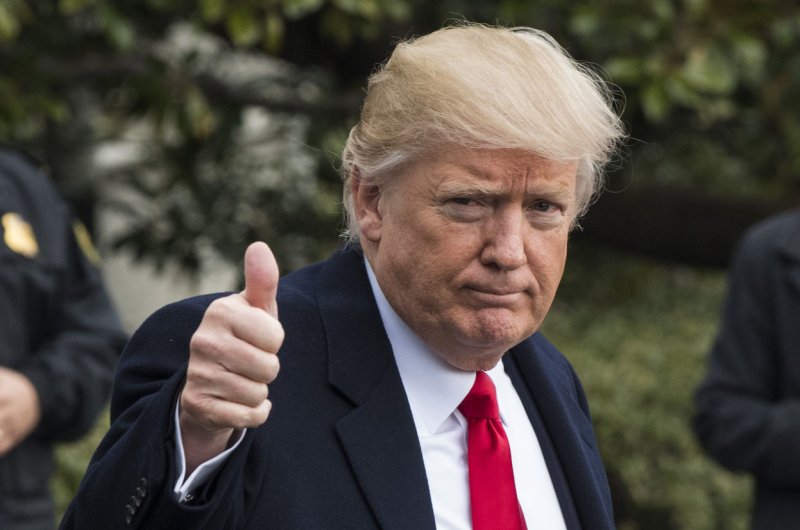President Donald Trump leaves the White House to board Marine One on the South Lawn on Friday, en route to Florida. A federal judge in Seattle ruled late Friday that the president's controversial executive order last week barring U.S. entry by immigrants and refugees is unconstitutional. Photo by Pat Benic/UPI |
License Photo
Feb. 4 (UPI) -- Two federal judges on opposite coasts issued separate and entirely different rulings late Friday -- one refusing to extend an injunction against President Donald Trump's order to suspend U.S. travel for migrants, and the other blocking its effect nationwide.
First, U.S. District Judge Nathaniel M. Gorton, in Boston, said in a preliminary 21-page ruling that he would not extend a seven-day restraining order that blocked the controversial executive order this week.
Plaintiffs in the suit claimed Trump's so-called "travel ban" poses irreparable harm for immigrants. Gorton disagreed, saying the opponents failed to prove their claims.
"In order to obtain a preliminary injunction or temporary restraining order, the moving party must establish 1) a reasonable likelihood of success on the merits, 2) the potential for irreparable harm if the injunction is withheld, 3) a favorable balance of hardships and 4) the effect on the public interest," Gorton wrote in his decision. "Because plaintiffs have not demonstrated that they are likely to succeed on the merits of any of their claims, an extension of the restraining order at the present time is not warranted."
Trump's order, signed last week, suspends the U.S. government's refugee program for 120 days, bars Syrian refugees indefinitely and prohibits U.S. entry for immigrants of seven predominantly Muslim countries -- Iran, Iraq, Syria, Libya, Sudan, Somalia and Yemen -- for three months.
The ruling was a significant victory for the Trump administration on the matter, but it didn't last very long.
A short time later, U.S. District Court Judge James Robart, in Seattle, upheld a challenge to Trump's order from the attorneys general of Washington state and Minnesota, and issued another temporary restraining order.
"The state has met its burden in demonstrating immediate and irreparable injury," Robart said
Protesters oppose President Donald Trump's executive order temporarily barring U.S. entry for refugees and immigrants at Los Angeles International Airport on January 29. Friday, a federal judge in Seattle issued a restraining order against the order, blocking it nationwide. Photo by Christine Chew/UPI
"[The] decision, effective immediately, effective now, puts a halt to President Trump's unconstitutional and unlawful executive order," Washington State Attorney General Bob Ferguson said. "It puts a stop to it immediately, nationwide.
"What the judge announced today was nationwide; the president's executive order does not apply."
Robart's decision is the most significant setback yet in the legal battle over the president's directive.
Both judges were appointed by former President George W. Bush.
The U.S. Department of Justice will now seek an emergency stay for the executive order, White House spokesman Sean Spicer said Friday night.
"The president's order is intended to protect the homeland and he has the constitutional authority and responsibility to protect the American people," he said in a statement. "As the law states, 'Whenever the President finds that the entry of any aliens or of any class of aliens into the United States would be detrimental to the interests of the United States, he may by proclamation, and for such period as he shall deem necessary, suspend the entry of all aliens or any class of aliens as immigrants or nonimmigrants, or impose on the entry of aliens any restrictions he may deem to be appropriate.'"
Earlier, the president addressed the immigration issue following Friday's attack at the Louvre Museum in France.
"We must keep 'evil' out of our country!" his tweet stated.
















